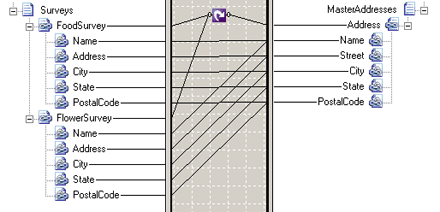Looping Functoid
The Looping functoid combines multiple records or fields in the source schema into a single record in the destination schema.
The following figure shows a Loopingfunctoid used in a map to combine addresses collected from two different surveys into a single master address list.
Note
The Looping and Value Mapping (Flattening) functoids should not be used together. If both are used together, it results in a compiled map that assumed there is no source looping dependency for the target nodes that are below the Looping functoid.

The FoodSurvey and FlowerSurvey looping records of the source schema are mapped to the looping Address record of the destination schema. If an input instance message has three FoodSurvey records and two FlowerSurvey records, the Loopingfunctoid combines these to create five Address records in the output instance message.
The following code is a sample input instance message.
<ns0:Surveys xmlns:ns0="http://LoopingFunctoid.Surveys">
<FoodSurvey Name="Karin Zimprich" Address="345 N 63rd St" City="Boston" State="MA" PostalCode="07485" />
<FoodSurvey Name="Wendy Wheeler" Address="7890 Broadway" City="Columbus" State="OH" PostalCode="46290" />
<FoodSurvey Name="Florian Voss" Address="1234 Main St" City="Denver" State="CO" PostalCode="97402" />
<FlowerSurvey Name="Kelly Focht" Address="456 1st Ave" City="Miami" State="FL" PostalCode="81406" />
<FlowerSurvey Name="Jim Kim" Address="567 2nd Ave" City="Seattle" State="WA" PostalCode="98103" />
</ns0:Surveys>
This input instance message produces the following output instance message when processed by the map in the preceding figure.
<ns0:MasterAddresses xmlns:ns0="http://LoopingFunctoid.MasterAddresses">
<Address Name="Karin Zimprich" Street="345 N 63rd St" City="Boston" State="MA" PostalCode="07458"/>
<Address Name="Wendy Wheeler" Street="7890 Broadway" City="Columbus" State="OH" PostalCode="46290"/>
<Address Name="Florian Voss" Street="1234 Main St" City="Denver" State="CO" PostalCode="97402"/>
<Address Name="Kelly Focht" Street="456 1st Ave" City="Miami" State="FL" PostalCode="81406"/>
<Address Name="Jim Kim" Street="567 2nd Ave" City="Seattle" State="WA" PostalCode="98103"/>
</ns0:MasterAddresses>
The FoodSurvey and FlowerSurvey message addresses have been combined. The combined message does not indicate the source of each address. If you want to track the source, add a Source attribute to the Address record of the MasterAddress schema and map a constant value. To set this value, connect the FoodSurvey field to the new Source field. On the connector line, modify the Link Properties | Compiler | Source Links property to "Copy name". Repeat this process for the FlowerSurvey field. Reprocessing the input message from above yields the following output:
<ns0:MasterAddresses xmlns:ns0="http://LoopingFunctoid.MasterAddresses">
<Address Name="Karin Zimprich" Street="345 N 63rd St" City="Boston" State="MA" PostalCode="07458" Source="FoodSurvey"/>
<Address Name="Wendy Wheeler" Street="7890 Broadway" City="Columbus" State="OH" PostalCode="46290" Source="FoodSurvey"/>
<Address Name="Florian Voss" Street="1234 Main St" City="Denver" State="CO" PostalCode="97402" Source="FoodSurvey"/>
<Address Name="Kelly Focht" Street="456 1st Ave" City="Miami" State="FL" PostalCode="81406" Source="FlowerSurvey"/>
<Address Name="Jim Kim" Street="567 2nd Ave" City="Seattle" State="WA" PostalCode="98103" Source="FlowerSurvey"/>
</ns0:MasterAddresses>
Relationships among nodes affect the behavior of the Looping functoid. For example, linking both a child node and its parent in the source schema to the Looping functoid prevents the destination node from being created.
Functoids are also affected by the relationships among source nodes. Connecting a functoid to non-sibling child fields of source nodes of the Looping functoid may produce unexpected results. For example, using the String Concatenate functoid to combine the FoodSurvey Name field and FlowerSurvey Address field into the Address Name field in MasterAddress would produce the following output instance message:
<ns0:MasterAddresses xmlns:ns0="http://LoopingFunctoid.MasterAddresses">
<Address Street="345 N 63rd St" City="Boston" State="MA" PostalCode="07458"/>
<Address Street="7890 Broadway" City="Columbus" State="OH" PostalCode="46290"/>
<Address Street="1234 Main St" City="Denver" State="CO" PostalCode="97402"/>
<Address Name="Kelly Focht" Street="456 1st Ave" City="Miami" State="FL" PostalCode="81406"/>
<Address Name="Jim Kim" Street="567 2nd Ave" City="Seattle" State="WA" PostalCode="98103"/>
</ns0:MasterAddresses>
Notice how the Name field is missing for FoodSurvey source messages but is present for FlowerSurvey source messages.
Important
Connecting a functoid to child fields of source nodes of the Looping functoid may produce unexpected results if the source nodes are not siblings.
The Looping functoid is a powerful construct that you can use to create conditional loops and to map schemas to catalogs. There are also some effects of overlapping Looping functoid paths you need to take into account.
Table Looping Functoid Reference in the UI guidance and developers API namespace reference